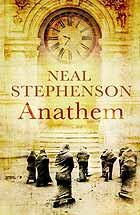
Whilst Alex was polishing off what turned out to be an excellent presentation for the afternoon session at Thinking Digital, I struggled on with Prezi . This is a fascinating tool for creating flash based presentations, but I think I need a good deal more practice with it, and a lot more design nous, in order to do presentations that actually look good rather than just weird. It's also quite easy to accidentally get things in the wrong order, and it's ironically quite hard to get an over view of the whole presentation and be sure you've included all you want to (I left out my flickr CC attributions! Web Crime!). And of course like any new toy it's an utter time sink- eating up perhaps eight hours to rehash a presentation I mostly had already got prepared and written an up and have already given a dozen times or more. Still, I will probably persist for a little while longer, and may even splurge on the stand alone version.
The free version is fully functional but you have to be online to use it. In
Being able to work offline would be a bonus with my commuting needs, but I'm not sure the branding freedom you also pay to get is actually worth it. OK, I get annoyed with D.O.G.s as much as the next person, but actually, using something this new and different it's helpful right now to have a little flag in the corner of the screen so people can see what I'm using- half the questions after my presentation were along the lines 'how did you do that- what software was it?' and I'm sure it would have been more if I hadn't pointed out the Prezi logo on screen.
This brings me in a round about way to the question of whether it worked, as in, did people get the message? In essence, I think it did work ok. My audience seemed attentive if not exactly enraptured, and I got a laugh and a couple of chuckles from three of the five humour points in the talk. It was a 15 minute slot at the end of a long (and late running) session- I was sixth of six presentations, and I was about two hours into the program as it ran. That’s not to say it was a hard crowd at all- they were switched on, all paying, and very intelligent and engaged, and all the other presenters had been excellent, entertaining and often profoundly motivational. So in all this, my tale of a BBC Micro for the 21st Century, as told through a spinny flash animation with a few pictures and a short film clip, worked well.
Another quick sidebar- in the end I didn't embed the video. This is because I only wanted to play a short part of the overall file, and I didn't have the kit handy to edit it down. Putting the whole clip into Prezi, online, would have turned it into a huge file and radically slowed down the whole save and download process. I think, if you're going to embed video, you need proper edit (and transcode) handy, and it's going to be easier to use the stand alone version of the software.
On stage I found it a very different experience to 'drive' compared with the way I usually use PowerPoint. In spite of it being a graphical 'look', the labourious online upload, especially on a flakey web link, meant that I ended up with a predominantly 'texty' rather than picturey presentation. All those text elements, instead of sitting in big chunks per slide, had their own, individual triggers and screens, so the talk bounced along with a new movement (and me clicking it) every 30 seconds or so. And then, when I did 'pop out' into one of my 3 minute rants, that seems a bit less organic to the whole piece (at least to me). I guess I'm just very used to (and bored with) powerpoint- anything else is going to take time to learn, and until I crack it, it's going to be intrucive into the presentations, and the creative process.
Love it though!
